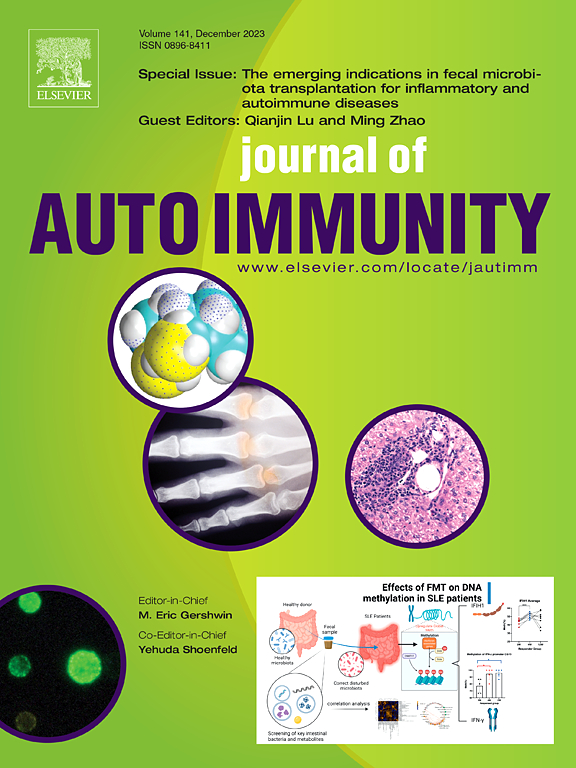原发性胆汁性胆管炎中新型 PDC-E2 表位的鉴定:工程Treg疗法的应用
IF 7.9
1区 医学
Q1 IMMUNOLOGY
引用次数: 0
摘要
原发性胆汁性胆管炎(PBC)是一种慢性自身免疫性肝病,其特点是肝内小胆管进行性破坏和门静脉炎症。治疗方法有限,晚期病例只能依靠肝移植。90-95%的患者体内存在以丙酮酸脱氢酶复合物(PDC-E2)E2亚基为靶点的抗线粒体抗体,T细胞浸润门静脉,因此适应性免疫反应与疾病的发病机制有关。在这里,我们研究了T细胞对源自PDC-E2的肽的反应,重点是局限于HLA II类DRB4∗01:01的CD4 T细胞反应,这是一种在62%的PBC患者中发现的等位基因,目的是发现可用于工程调节性T细胞(Treg;EngTreg)疗法的PDC-E2表位。通过活化诱导标记检测和单细胞 RNA 测序,我们发现在 T 传统细胞 (Tconv) 和 Treg 中,对 PDC-E2 表位有反应的 CD4 T 细胞克隆扩增。这些T细胞受体(TCR)谱系是不重叠的、私有的,包括对局限于DRB4∗01:01的新型PDC-E2表位特异的TCR。对 PDC-E2 新型表位有反应的 CD4 Tconv 细胞表现出表型异质性,偏向于 T 滤泡辅助细胞。我们利用特异于这种新型 PDC-E2 表位的 TCR 创建了一种 EngTreg,它能抑制 PBC 患者的 PDC-E2 特异性多克隆 CD4 Tconv 细胞。这项研究增进了人们对 PDC-E2 特异性 T 细胞反应的了解,并提出了 Tconv 和 Tregs 都能识别的新型 PDC-E2 表位。针对该表位生成特异性 EngTreg 为 PBC 的治疗提供了潜力。本文章由计算机程序翻译,如有差异,请以英文原文为准。
Identification of a novel PDC-E2 epitope in primary biliary cholangitis: Application for engineered Treg therapy
Primary biliary cholangitis (PBC) is a chronic autoimmune liver disease, characterized by progressive destruction of small intrahepatic bile ducts and portal inflammation. Treatment options are limited, with reliance on liver transplantation in advanced cases. The adaptive immune response is implicated in disease pathogenesis by the presence of anti-mitochondrial antibodies targeting the E2 subunit of the pyruvate dehydrogenase complex (PDC-E2) in 90–95 % of patients and T cells infiltrating the portal tracts. Here, we examined T cell responses to peptides derived from PDC-E2, with a focus on CD4 T cell responses restricted to HLA Class II DRB4∗01:01, an allele found in 62 % of PBC patients, to uncover PDC-E2 epitopes that could be used for engineered regulatory T cell (Treg; EngTreg) therapy. Using an activation-induced marker assay and single cell RNA-sequencing, we found clonal expansion of CD4 T cells reactive to PDC-E2 epitopes among both T conventional (Tconv) and Tregs. Those T cell receptor (TCR) repertoires were non-overlapping and private and included TCRs specific for a novel PDC-E2 epitope restricted to DRB4∗01:01. CD4 Tconv cells reactive to the PDC-E2 novel epitope showed phenotypic heterogeneity skewed towards T follicular helper cells. Using a TCR specific for this novel PDC-E2 epitope, we created an EngTreg that suppressed PDC-E2-specific polyclonal CD4 Tconv cells from PBC patients. This study advances knowledge of PDC-E2-specific T cell responses and introduces a novel PDC-E2 epitope recognized by both Tconv and Tregs. Generation of EngTreg specific for this epitope provides therapeutic potential for PBC.
求助全文
通过发布文献求助,成功后即可免费获取论文全文。
去求助
来源期刊

Journal of autoimmunity
医学-免疫学
CiteScore
27.90
自引率
1.60%
发文量
117
审稿时长
17 days
期刊介绍:
The Journal of Autoimmunity serves as the primary publication for research on various facets of autoimmunity. These include topics such as the mechanism of self-recognition, regulation of autoimmune responses, experimental autoimmune diseases, diagnostic tests for autoantibodies, as well as the epidemiology, pathophysiology, and treatment of autoimmune diseases. While the journal covers a wide range of subjects, it emphasizes papers exploring the genetic, molecular biology, and cellular aspects of the field.
The Journal of Translational Autoimmunity, on the other hand, is a subsidiary journal of the Journal of Autoimmunity. It focuses specifically on translating scientific discoveries in autoimmunity into clinical applications and practical solutions. By highlighting research that bridges the gap between basic science and clinical practice, the Journal of Translational Autoimmunity aims to advance the understanding and treatment of autoimmune diseases.
 求助内容:
求助内容: 应助结果提醒方式:
应助结果提醒方式:


